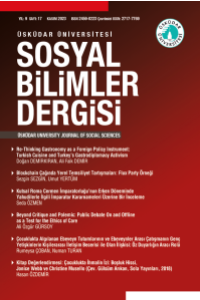Kutsal Roma Cermen İmparatorluğu’nun Erken Döneminde Yahudilerle İlgili İmparator Kararnameleri Üzerine Bir İnceleme
Abstract
Alman Kralı I. Otto 962 yılında Papa XII. Johannes’in elinden Roma imparatoru tacını giymiş ve böylece Alman krallığı Kutsal Roma Germen İmparatorluğu’na dönüşmüştür. Krallık geleneğiyle Roma mirasını birleştiren imparatorluk kendine has bir idari yapı ve yasal sistem meydana getirmiştir. Sınıflı toplum yapısı, feodal güçlerin siyasi rolü ve Katolik Kilisesi’nin dünyevi alana uzanan manevi gücüyle tanımlanan imparatorlukta, kararnameler imparator otoritesinin temel dokümanlarını oluşturmuştur. İmparatorluğu ilgilendiren hemen her konuda imparatorların emirlerini içeren kararnamelerin bir kısmı imparatorluk topraklarında yaşayan Yahudilerle ilgili olmuştur. Kararnamelerde imparatora bağlı özel bir halk olarak değerlendirilen Yahudilerin hukuki durumu sürekli değişiklik göstermiş; sonuçta ayrıcalıklar ve kısıtlamalar arasında istikrarsız bir tablo ortaya çıkmıştır. Tanımlanan siyasi ve yasal statünün oluşumunda çeşitli türde faktörler etkili olmuşsa da bunların kökeni ve motivasyonu, her şeyden önce, Yahudilerin dinsel farklılığı olmuştur. Çalışmada, on dokuzuncu asra değin varlığını sürdürmüş ve geniş bir coğrafyaya hükmetmiş olan Kutsal Roma Germen İmparatorluğu’nun Orta Çağ kapsamına giren erken dönemi -on birinci ve on beşinci asırlar arasındaki dönem- dikkate alınmıştır. Makalenin sınırlılıkları sebebiyle bu süre zarfında iktidara gelen imparatorların genellikle Yahudilere tanıdığı imtiyazlar çerçevesinde şekillenen kararlarından bir kısmı değerlendirilebilmiştir. Kararnamelerde çerçevesi çizilen imtiyazlar, tanınan hak ve özgürlükler, getirilen kısıtlamalar ve yasaklamalar gibi unsurlar kronolojik olarak sunulmuş, karşılaştırmalı olarak ele alınmış ve bunlar üzerinden imparatorluğun içinde bulunduğu dönemde yaşanan dini, ekonomik ve sosyal değişimlerin Yahudilerin yasal durumuna etkisi ortaya koyulmaya çalışılmıştır.
References
- Bryce, James. The Holy Roman Empire. New York: Macmillan and Co., 1889.
An Analysis on the Imperial Decrees Concerning the Jews in the Early Period of the Holy Roman Empire
Abstract
kingdom into the Holy Roman German Empire. Combining the royal tradition with the Roman heritage, the empire created a unique administrative structure and legal system. In the empire, which was defined by the class society structure, the political role of the feudal powers and the spiritual power of the Catholic Church extending to the worldly realm, the decrees formed the basic documents of the emperor's authority. Some of the decrees containing the orders of the emperors on almost every issue concerning the empire were also related to the Jews living in the imperial lands. The legal situation of the Jews, who were considered a special people subordinate to the emperor in the decrees, has constantly changed; as a result, an unstable picture has emerged between privileges and restrictions. Although various kinds of factors were influential in the formation of the defined political and legal status, their origin and motivation was, above all, the religious difference of the Jews. Due to the limitations of the article, some of the decisions of the emperors who came to power during this period, which were generally shaped within the framework of the privileges granted to the Jews, could be evaluated. In the study, the early period of the Holy Roman German Empire, which existed until the nineteenth century and ruled over a wide geography, included in the Middle Ages -the period between the eleventh and fifteenth centuries- was taken into account. Elements such as the privileges, rights and freedoms, restrictions and prohibitions outlined in the decrees were presented chronologically, dealt with comparatively, and the effect of the religious, economic and social changes experienced in the period of empire on the legal status of the Jews has been tried to be revealed.
Keywords
References
- Bryce, James. The Holy Roman Empire. New York: Macmillan and Co., 1889.
Details
| Primary Language | Turkish |
|---|---|
| Subjects | Medieval European History |
| Journal Section | Research Article |
| Authors | |
| Early Pub Date | December 31, 2023 |
| Publication Date | December 31, 2023 |
| Submission Date | August 15, 2023 |
| Published in Issue | Year 2023 Issue: 17 |
Cite
The opinions in the articles published in Üsküdar University Journal of Social Sciences belong to the author. The articles published in another journal, book, and so on are not accepted. National or international conference presentations, seminar presentations, or panel presentations can be included in the publication process after being specified in the footnote and converted into the article format.
Academic articles published in the journal can only be reproduced for educational purposes. The articles and the graphics and tables in the articles cannot be duplicated or archived in part or as a whole without permission except for educational purposes. Quotations may be made from the articles under the condition that they are indicated in the academic publications.
It is assumed that the authors undertake that they would not claim royalties for the articles they submit to Üsküdar University Journal of Social Sciences.


